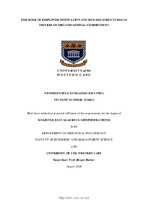| dc.contributor.advisor | Becker, Jürgen | |
| dc.contributor.author | Kwatsha, Ntombizanele Nangamso | |
| dc.date.accessioned | 2021-08-19T08:27:03Z | |
| dc.date.available | 2021-08-19T08:27:03Z | |
| dc.date.issued | 2021 | |
| dc.identifier.uri | http://hdl.handle.net/11394/8360 | |
| dc.description | Magister Commercii (Industrial Psychology) - MCom(IPS) | en_US |
| dc.description.abstract | Robbins and Judge (2013, p. 13) define an organisation as a “consciously coordinated social unit, composed of two or more people, that functions on a relatively continuous basis to achieve a common goal or set of goals.” Since an organisation’s effectiveness is the result of the level of individual and collective employee performance (i.e. teams and organisational units) and their success in attaining these shared goals, organisations have realised the potential of people as a source of competitive advantage (Pfeffer, 1994).
The financial services industry has become fiercely competitive and is largely dependent on the collection of individuals working together to create the services that clients demand and are willing to pay for. South Africa has one of the best-developed financial sectors in the world and competition between the four major banks and insurance providers is fierce (Bhorat, Hirsch, Kanbur & Ncube, 2014). Since companies in the financial sector provide more or less the same services, they depend on their workers to transform scarce resources into valued services that clients demand. | en_US |
| dc.language.iso | en | en_US |
| dc.publisher | University of Western Cape | en_US |
| dc.subject | Employee motivation | en_US |
| dc.subject | Intrinsic motivation | en_US |
| dc.subject | Extrinsic motivation | en_US |
| dc.subject | Financial institution | en_US |
| dc.subject | Affective commitment | en_US |
| dc.title | The role of employee motivation and reward structures as drivers of organisational commitment | en_US |
| dc.rights.holder | University of Western Cape | en_US |

